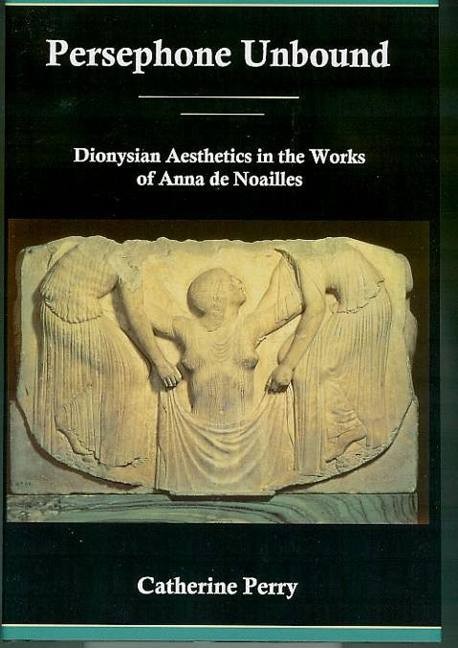 A celebrated poet in France during her lifetime, Anna de Noailles (1876-1933) gradually lost critical attention after her death. This book, the first on the poet to appear in English, re-examines her extensive poetry and prose, alongside manuscripts and private documents, in relation to the works of French and European artists and thinkers from among her predecessors as well as her contemporaries. The author shows how this woman of foreign origins envisioned and constructed an original poetic world by actively engaging with her literary and intellectual heritage–as represented by Lamartine, Hugo, Baudelaire, Mallarmé, Proust, Schopenhauer, and Rilke, among others–while discovering vital sources of inspiration in her Greek ancestry and in Nietzsche’s ground-breaking philosophy. Not only did Noailles create a distinctive voice in the world of French letters but her influence reached writers of both genders in France, in other European countries, and across the Atlantic. Best understood in terms of a Dionysian aesthetics, her work is sensual, erotic, and playful, but also reflective, violent on occasion, and always marked by a tragic undercurrent that becomes magnified with time. Beyond the prominent place she held in the world of French letters, Noailles’ lifelong commitment to artistic creation invites a reconsideration of her work.
A celebrated poet in France during her lifetime, Anna de Noailles (1876-1933) gradually lost critical attention after her death. This book, the first on the poet to appear in English, re-examines her extensive poetry and prose, alongside manuscripts and private documents, in relation to the works of French and European artists and thinkers from among her predecessors as well as her contemporaries. The author shows how this woman of foreign origins envisioned and constructed an original poetic world by actively engaging with her literary and intellectual heritage–as represented by Lamartine, Hugo, Baudelaire, Mallarmé, Proust, Schopenhauer, and Rilke, among others–while discovering vital sources of inspiration in her Greek ancestry and in Nietzsche’s ground-breaking philosophy. Not only did Noailles create a distinctive voice in the world of French letters but her influence reached writers of both genders in France, in other European countries, and across the Atlantic. Best understood in terms of a Dionysian aesthetics, her work is sensual, erotic, and playful, but also reflective, violent on occasion, and always marked by a tragic undercurrent that becomes magnified with time. Beyond the prominent place she held in the world of French letters, Noailles’ lifelong commitment to artistic creation invites a reconsideration of her work.
Through the focusing lens of Anna de Noailles, Persephone Unbound revives multiple facets of the culture in which she wrote. More crucially still, it reevaluates a writer whose historical stature and whose incorporation by the French establishment as a representative of “feminine” poetry have tended to overshadow her literary merits. With respect to her poetry in particular, critics have often failed to recognize the modernity of its lyric voice on account of its traditional verse patterns. Reflecting a dual attitude of competition and cooperation with her cultural world, Noailles held a similarly double-voiced discourse toward conventional interpretations of woman. Her classification in literary history as a belated French Romantic further obfuscates the significance of her work. While recognizing her predecessors, Noailles was frequently unable to find adequate models in their works for a distinct poetic identity. In seeking new versions of the feminine self, she acknowledged women who were unable to write and, more broadly, she attempted to provide a formerly silent Muse with voice and presence. Noailles’ Greek inheritance also enabled her to reclaim mythical figures such as those of Persephone and Antigone, and thus to invigorate the link that French poetry had established with antiquity. The book further evaluates Noailles’ unique positions on social-sexual politics as they find expression in her little-known relationship with the nationalist writer Maurice Barrès. First made available to readers in 1991, their correspondence discloses how Barrès found in Noailles a long-sought muse even while he rejected her progressive politics. The author analyzes both Noailles’ renditions of this relationship and the oscillation in Barrès’s works between the symbolic significance he attached to Noailles as a quasi-miraculous incarnation of his fascination with Dionysian values and his equally forceful denial of a poet whose inspiration clashed with his philosophy of nationalist action.